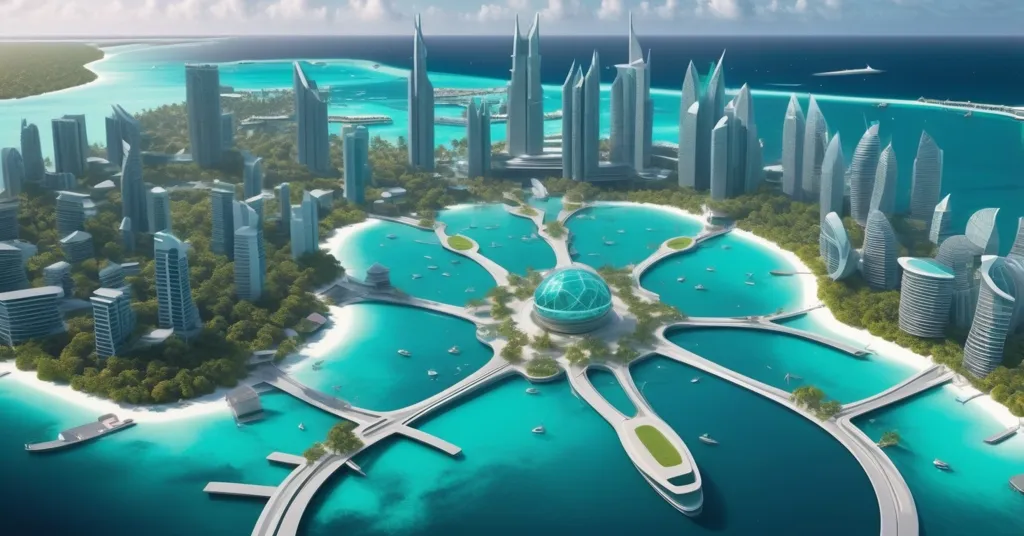Maldives Unveils $9B Crypto City to Rival Dubai and Singapore

Maldives Launches $9 Billion Crypto City to Challenge Economic Giants
The Maldives is embarking on a bold $9 billion project, the Maldives International Financial Centre (MIFC), aimed at transforming its capital, Malé, into a global hub for blockchain and digital finance. This ambitious venture seeks to reduce the country’s reliance on tourism and fisheries, positioning it as a competitor to established crypto hubs like Dubai, Singapore, and Hong Kong.
- $9 billion MIFC aims to triple GDP and create 16,000 jobs
- Project includes digital finance, blockchain, and Web3 developments
- Challenges include local expertise and high public debt
- MBTI program to train 5,000 professionals
The Maldives, usually celebrated for its turquoise waters and pristine beaches, is now making waves in the cryptocurrency world. The MIFC, a project spearheaded by Dubai-based MBS Global Investments, is set to span 830,000 square meters in Malé. It’s not just about building a city; it’s about forging a new economic path. The initiative aims to triple the current $7 billion GDP and create 16,000 jobs within five years, a testament to the transformative potential of blockchain technology.
The MIFC will be a comprehensive development, featuring a digital finance and banking district, a blockchain data center, a Web3 startup campus, and high-end residential and commercial spaces. It also includes a freezone designed to lure foreign direct investment with enticing incentives like 100% foreign ownership and 20-year tax holidays. But let’s not sugarcoat it—building a blockchain powerhouse from scratch is like trying to teach a penguin to surf. It’s ambitious, to say the least.
One of the biggest hurdles? The Maldives’ lack of local blockchain expertise. To tackle this, the Maldives Blockchain Talent Outreach (MBTI) program is set to train 5,000 professionals over five years, collaborating with the Maldives National University, Binance Academy, and ConsenSys Academy. Long-term visas will also be on offer to attract foreign blockchain experts, because who wouldn’t want to code on a tropical island?
Security is another critical issue in the crypto world, and the MIFC isn’t cutting corners. It plans to deploy RegTech (regulatory technology) solutions and blockchain analytics to combat financial crimes, ensuring the safety of transactions. Think of it as putting a digital lock on paradise.
With public debt already over 100% of GDP, the Maldives is making a risky bet on this venture. Yet, the potential rewards are tantalizing, with experts from Binance Research predicting that MIFC could become one of the top blockchain projects in Asia-Pacific by 2025. But let’s not forget, the crypto world is as unpredictable as the ocean currents around the Maldives. Navigating global acceptance and regulation will be no small feat.
Despite these challenges, the optimism is palpable. The MIFC could be the beacon that diversifies the Maldives’ economy, drawing in digital nomads and innovative businesses. But let’s keep our feet on the ground—or rather, our flippers in the sand. Transforming a paradise island into a blockchain hub is no walk on the beach. It’s a bold, ambitious leap into the unknown, and we’re here for it.
Let’s dive into some key questions and takeaways:
- What is the Maldives International Financial Centre (MIFC)?
The MIFC is a $9 billion blockchain finance center being developed in Malé, Maldives, to reduce the country’s dependence on tourism and fisheries, aiming to triple its GDP and create 16,000 jobs within five years.
- How will the MIFC impact the Maldives’ economy?
The MIFC is expected to significantly diversify and strengthen the economy by tripling the GDP from $7 billion and creating 16,000 jobs, reducing reliance on vulnerable sectors like tourism and fisheries.
- What are the main components of the MIFC?
The MIFC includes a digital finance and banking district, a blockchain data center, a Web3 startup campus, high-end residential and commercial developments, and a freezone with attractive incentives for investors.
- What are the economic challenges faced by the Maldives?
The Maldives faces challenges due to its heavy reliance on tourism and fisheries, exacerbated by public debt over 100% of GDP and vulnerabilities to pandemics and climate change.
- How does the Maldives plan to compete with other crypto hubs like Dubai, Singapore, and Hong Kong?
The Maldives aims to attract foreign investment through incentives such as 100% foreign ownership, 20-year tax holidays, and long-term residency visas, leveraging its strategic geographic position.
- What measures are being taken to develop local blockchain expertise?
The Maldives Blockchain Talent Outreach (MBTI) will train 5,000 professionals over five years in collaboration with Maldives National University, Binance Academy, and ConsenSys Academy, while also offering long-term visas to foreign blockchain experts.
- How will the MIFC ensure the security of cryptocurrency transactions?
The MIFC will use RegTech products and blockchain analytics to counter financial crimes and ensure secure cryptocurrency transactions.
“The initiative, formally known as the Maldives International Financial Centre (MIFC), will be developed over five years in the capital city of Malé.”
“The Maldivian economy is heavily dependent on tourism (30% of GDP) and fisheries (10%), with yellowfin and skipjack tuna exports to the EU, Japan, and Thailand being the main export to the EU.”
“Experts from Binance Research consider MIFC to be one of the top blockchain projects in Asia-Pacific by 2025.”
As the Maldives sets its sights on becoming a blockchain powerhouse, the world watches with keen interest. Will this ambitious venture pay off, or will it be a cautionary tale of overreaching ambition? Only time will tell, but for now, the journey promises to be as thrilling as the destination.



